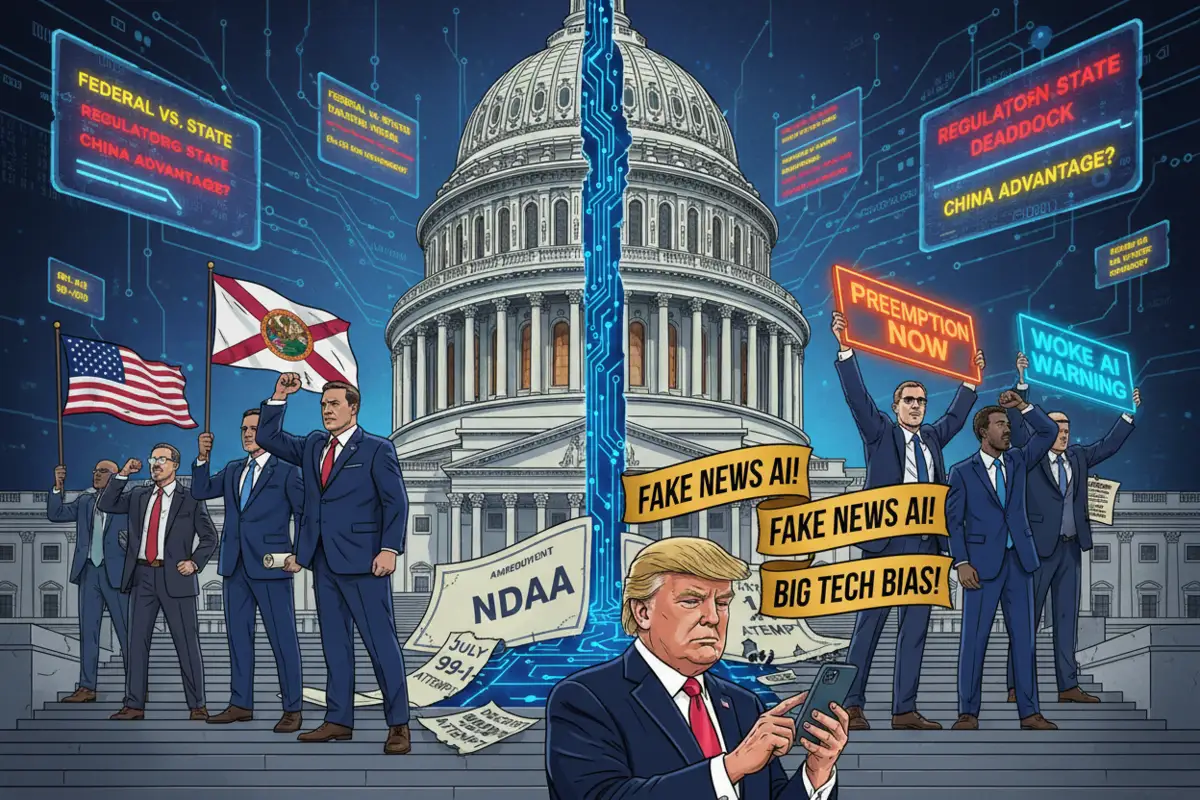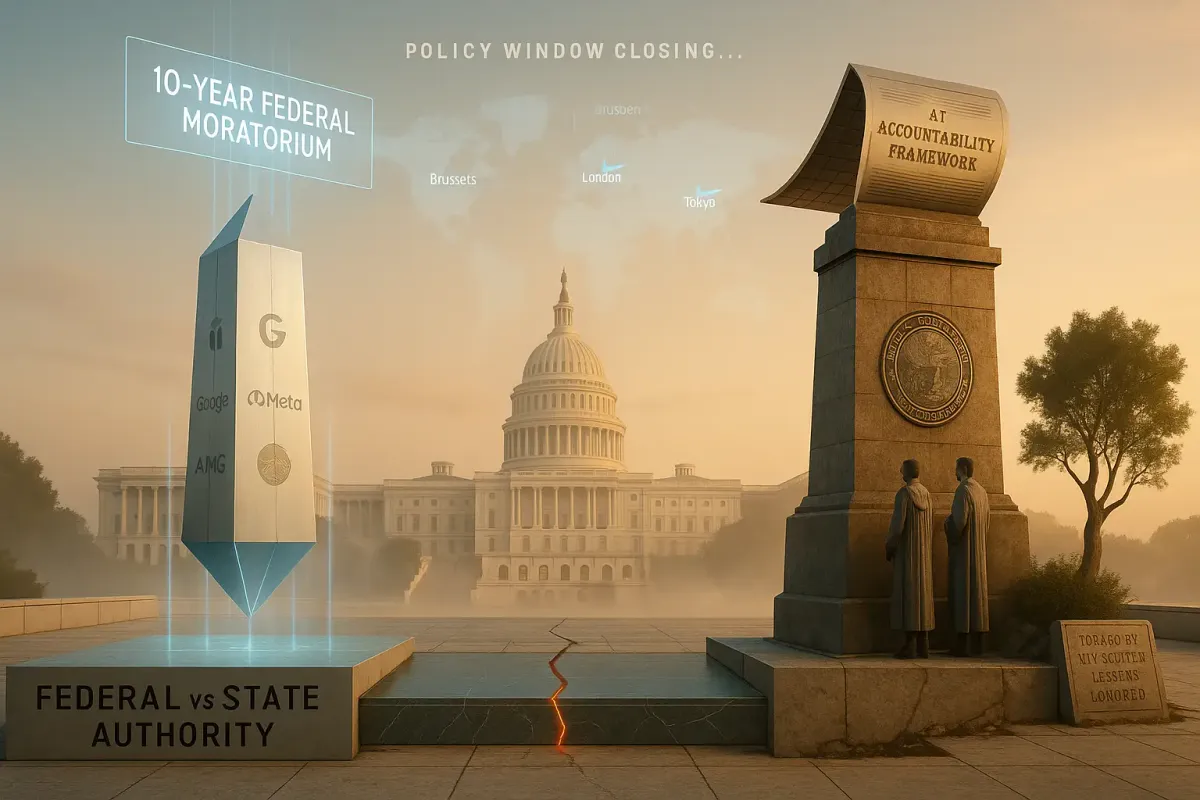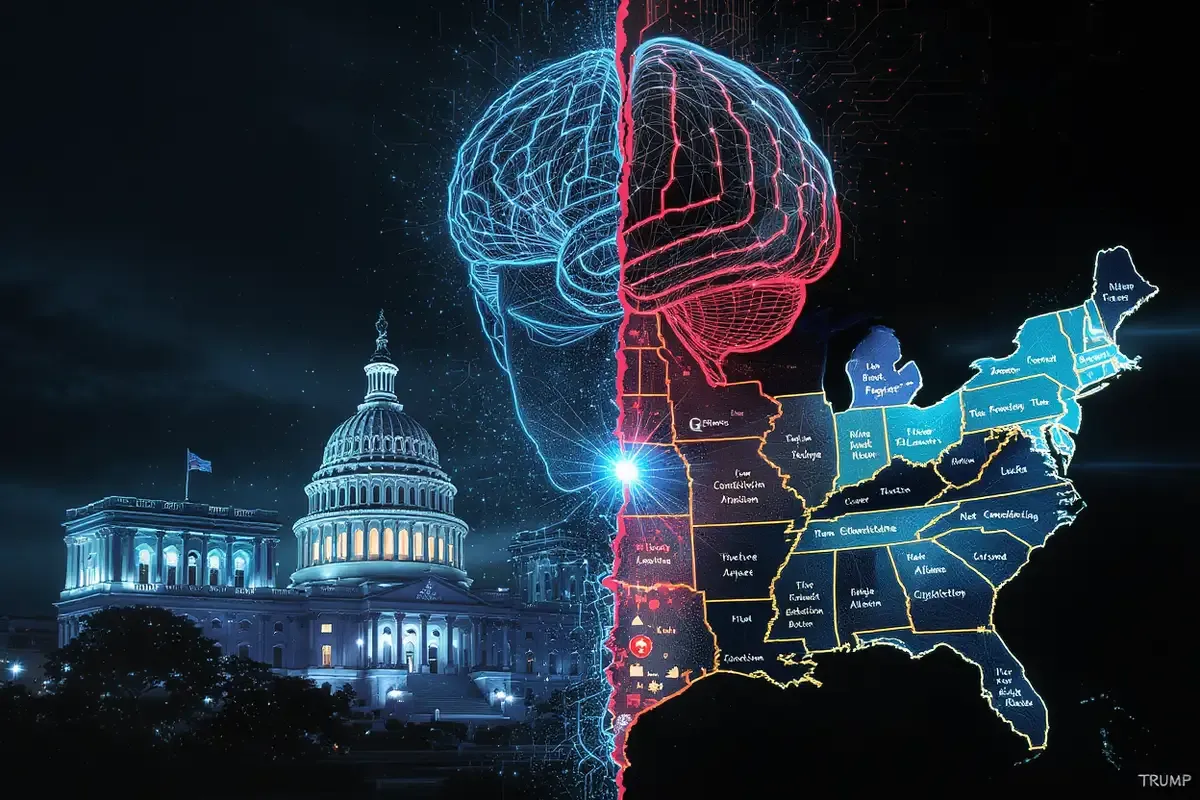The White House is drafting an executive order to weaken or override state artificial intelligence laws through federal lawsuits and funding threats, marking the administration's latest attempt to revive an approach the Senate rejected 99-1 earlier this year. President Donald Trump announced the effort Tuesday in a Truth Social post warning that "overregulation by the States" threatens to let China win the AI race, despite telling Saudi investors the same day that America leads "by a lot."
The draft order, dated November 19 and obtained by multiple outlets, directs Attorney General Pam Bondi to establish an "AI Litigation Task Force" with a primary mission. challenge state AI laws on grounds they unconstitutionally regulate interstate commerce. The mechanism also threatens to withhold Broadband Equity Access and Deployment funding from states whose AI regulations the administration deems "onerous," and tasks the Federal Communications Commission, Federal Trade Commission, and Commerce Department with 90 day deadlines to challenge or constrain state rules and consider federal standards that could preempt conflicting state requirements.
One problem. Executive orders do not by themselves preempt state laws. That typically requires acts of Congress or at least regulations grounded in clear statutory authority. Congress already refused a similar 10 year clampdown on state AI regulation this summer when Senate Republicans tried to insert a moratorium into Trump's signature tax legislation. The provision disappeared under pressure from a coalition of Republican governors, conservative senators, and tech skeptical activists who denounced it as a Big Tech bailout, after Representative Marjorie Taylor Greene joined the opposition and threatened to vote against the bill.
The Breakdown
• Draft executive order creates DOJ task force to sue states over AI laws, threatens to withhold $42.5 billion in broadband funding
• Senate voted 99-1 against identical preemption language in June, removed it from Trump's tax bill after conservative Republican revolt
• GOP governors DeSantis and Sanders oppose as Big Tech bailout, defending state child safety and discrimination protections
• White House lacks constitutional authority to preempt state laws, that power belongs exclusively to Congress under federalism principles
The Legal Mechanism That Can't Work
Trump's draft pulls constitutional arguments straight from venture capital talking points. The dormant Commerce Clause gets invoked to stop states from burdening interstate business. Andreessen Horowitz promoted that exact theory in a September policy essay. The order goes after California's SB 53 on catastrophic risk reporting and Colorado's new law restricting algorithmic discrimination. According to the preamble, both laws come from "sophisticated proponents of a fear based regulatory capture strategy." That's one way to describe civil rights protections and safety standards.
The First Amendment claim is more creative. Any disclosure requirement that makes AI companies report what their models do might violate free speech. Courts will love that one.
Executive orders tell agencies what to study, where to file lawsuits, how to prioritize enforcement. They don't repeal state statutes on their own. Commerce Secretary Howard Lutnick could threaten broadband funding. The FCC under Brendan Carr might propose federal reporting standards. The FTC could issue a policy statement on AI related deception. None of that achieves sweeping preemption without federal law to back it, which Congress already voted 99-1 against in June.
The draft implicitly acknowledges the gap by tasking David Sacks, Trump's AI and crypto adviser, with developing legislative recommendations. Congress answered already.
Republican Fracture Lines
Trump's push for federal AI preemption exposes deepening divisions within the Republican coalition that carried him to reelection. On one side stand Big Tech investors and executives who bankrolled Trump's 2024 campaign and now occupy influential advisory roles. Sacks, a billionaire venture capitalist, appears throughout the draft order as the official coordinating agency level implementation. Nvidia CEO Jensen Huang recently warned that "China is going to win the AI race" without regulatory streamlining, later clarifying on X that China sits "nanoseconds behind America in AI" and arguing that the United States must "race ahead and win developers worldwide."
Republican governors aren't buying it. Florida's Ron DeSantis, Arkansas's Sarah Huckabee Sanders, and former Trump adviser Steve Bannon have all publicly opposed federal preemption as a form of corporate favoritism wrapped in national security rhetoric. Sanders, who led a bloc of GOP governors this summer in pressuring Congress to reject the tax bill provision, wrote on X Wednesday that "now isn't the time to backtrack" on protecting state level child exploitation safeguards. Her Arkansas law banning AI generated child sexual abuse material would likely fall within the scope of broad federal preemption.
Senate conservatives share that skepticism. Missouri's Josh Hawley suggested the renewed preemption push "shows what money can do" when asked about efforts to attach similar language to the National Defense Authorization Act. Hawaii's Brian Schatz, a Democrat, vowed to block what he termed a "poison pill" if Republicans attempt the NDAA insertion. Senate leaders have tried to thread the needle in public, saying any compromise should "ensure states have some role" while "recognizing the importance" of interstate commerce, even as members take a hard look at how to reconcile Trump's demands with longstanding states' rights concerns.
The ideological split breaks along familiar fault lines. Tech aligned Republicans emphasize competition with China and economic growth. States' rights conservatives point to specific harms, child safety, algorithmic discrimination, workforce displacement, that federal agencies have failed to address. Sanders's defense of Arkansas's child exploitation ban illustrates the tension. Federal preemption does not automatically replace state protections with stronger federal rules. It risks creating a regulatory vacuum while agencies develop standards that may never materialize.
The China Argument That Cuts Both Ways
Trump's framing relies heavily on competitive anxiety about China. His Truth Social post warned that without federal standardization, "China will easily catch us in the AI race." He repeated the theme Wednesday at the U.S. Saudi Investment Forum, claiming state level rules create a compliance "disaster" because "you'll have one woke state and you'll have to do all woke."
The argument contains internal contradictions. Trump told Saudi investors Tuesday that America leads China in AI "by a lot," directly undercuting his preemption rationale. An Edelman poll published November 19 revealed an 87 percent trust rating for AI among Chinese respondents versus 32 percent among Americans. That trust gap, not regulatory burden, may better explain China's faster AI adoption. Chinese citizens express overwhelming confidence in technology deployment. Americans, particularly younger cohorts where Chinese trust exceeds that of young Americans by wide margins, remain skeptical.
Beijing's AI regulation looks nothing like the hands off model Trump wants. Content controls, data localization, algorithmic transparency rules, all of it stricter than anything California or Colorado have contemplated. Chinese AI companies answer to centralized oversight that would make American firms revolt. The comparison falls apart on inspection. Different governance models produce different innovation paths. American skepticism about AI runs deeper than compliance forms.
Tech executives pushing preemption talk exclusively about costs. Fifty state frameworks mean legal teams and engineering adjustments that startups can't easily afford. Fair point. Not a national security emergency, especially when the same companies comply with Beijing's far tougher requirements to access Chinese markets.
What Agencies Can Actually Do
Trump's draft gives multiple agencies 90 day deadlines. What they can deliver matters less than what they can't.
Commerce Secretary Lutnick gets to review state AI laws and issue BEAD funding guidelines. The 42.5 billion dollar broadband program targets underserved areas. Tying those dollars to AI policy creates the kind of coercive federalism that raised constitutional problems in NFIB v. Sebelius. States will sue immediately. Conditioning highway funds on unrelated policy compliance has limits.
FCC Chairman Carr would "initiate a proceeding" on federal AI disclosure standards that preempt conflicting state rules. The FCC regulates communications infrastructure. Software and AI development sit at the edge of that jurisdiction. Carr can propose anything he wants. Courts decide whether agencies exceeded their authority. And preemption still depends on firm congressional grounding.
The FTC gets to issue a policy statement on how unfair and deceptive practices law applies to AI. Useful for clarifying federal enforcement priorities. Does not override state consumer protections that go further. States maintain stronger rules than federal minimums all the time. That's federalism.
Bondi's litigation task force offers the clearest path. Justice Department lawyers file suits challenging specific state laws on Commerce Clause or First Amendment grounds. Years of litigation follow. Uncertain outcomes await. Courts generally uphold state authority to regulate business conduct within their borders, provided the rules don't discriminate against interstate commerce or contradict federal statutes. California's catastrophic risk reporting applies equally to everyone above a threshold. Colorado's algorithmic discrimination law extends existing civil rights frameworks into automated decision making. Neither looks obviously unconstitutional, but DOJ will try anyway.
The NDAA Gambit
Republicans want to slip AI preemption into the National Defense Authorization Act. The annual defense bill has to pass. Attaching controversial provisions to must pass legislation is standard Washington practice.
This summer that strategy cratered when preemption disappeared from Trump's tax bill after backlash from Republican governors, conservative senators, and activists, with MTG among those threatening to rebel if the moratorium stayed in. Trying again through NDAA means fighting the same battle with worse positioning. Republican governors oppose it. Conservative senators are skeptical. Brian Schatz promises procedural warfare. The year end legislative calendar is already packed with government funding deadlines and debt ceiling negotiations.
Cautious language from GOP leadership about balancing state roles with interstate commerce signals trouble. Leadership knows the votes aren't there but can't say so publicly while Trump demands action.
Defense authorization covers military readiness, procurement, personnel policy. Using it to preempt state AI regulation stretches the bill's scope to the breaking point. That invites poison pill amendments. The whole package could sink.
Why This Matters
Silicon Valley is choosing between short term relief and long term blowback. Compliance costs are real. Navigating multiple state frameworks burns money. Federal preemption solves that problem today while igniting a states' rights fight that could produce far tougher federal rules tomorrow. California and Colorado moved first. Dozens of other states are drafting or enacting bills. Forcing a showdown now, when public trust in AI sits at 32 percent, seems like poor timing.
Trump is testing how far executive power stretches after congressional rejection. The 99-1 Senate vote wasn't ambiguous. Using agency action and funding leverage to accomplish what legislation couldn't sets a precedent that survives this administration. Conditioning broadband funding on AI policy means future presidents can try to tie highway dollars to climate rules or education grants to curriculum standards. The Commerce Clause questions extend far beyond tech policy.
Comparing America to China misses why Chinese citizens trust AI and Americans don't. Regulatory fragmentation creates compliance headaches. It doesn't explain the 55 point trust gap between countries. Algorithmic bias, labor displacement, misinformation amplification, corporate accountability, Americans debate these tensions openly. States are laboratories for those experiments. China's centralized model moves faster by eliminating exactly that kind of democratic friction. Framing state level consumer protections as a competitive disadvantage against authoritarian efficiency is quite the tell.
❓ Frequently Asked Questions
Q: What is California's SB 53 that Trump wants to override?
A: SB 53 requires AI developers to report potential catastrophic risks from their models. The draft executive order calls it "a complex and burdensome disclosure and reporting law premised on the purely speculative suspicion that AI might pose catastrophic risk." California passed it alongside other AI safety measures that Trump's team views as obstacles to innovation.
Q: How much federal funding could states lose under this order?
A: The order threatens to withhold money from the Broadband Equity Access and Deployment program, which allocates $42.5 billion to expand internet access in underserved areas. Commerce Secretary Howard Lutnick would determine which states have "onerous" AI laws that make them ineligible for non-deployment funds. States would almost certainly sue over this condition.
Q: What's the dormant Commerce Clause and why does it matter here?
A: It's a constitutional doctrine preventing states from placing excessive burdens on interstate business. The draft order borrows this argument directly from a September white paper by Andreessen Horowitz, which claimed state AI laws create compliance nightmares for companies operating across multiple jurisdictions. Courts would decide if California and Colorado's rules actually violate this principle.
Q: Why did the Senate vote 99-1 against AI preemption earlier this year?
A: In June 2025, senators rejected nearly identical language that would have blocked state AI laws for 10 years. The provision was part of Trump's tax legislation but disappeared after Representative Marjorie Taylor Greene threatened to kill the entire bill. Tech-skeptical conservatives called it a Big Tech bailout that stripped states of consumer protection authority.
Q: Who is David Sacks and what's his role in this executive order?
A: Sacks is a billionaire venture capitalist serving as Trump's Special Advisor for AI and Crypto. The draft order tasks him with coordinating agency-level implementation and developing legislative recommendations alongside the White House Office of Legislative Affairs. He appears throughout the document as the official overseeing multiple federal agencies' work on AI preemption.















